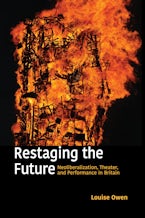An examination of neoliberal ideology's ascendance in 1990s and 2000s British politics and society through its effect on state-supported performance practices
Post-Thatcher, British cultural politics were shaped by the government's use of the arts in service of its own social and economic agenda. Restaging the Future: Neoliberalization, Theater, and Performance in Britain interrogates how arts practices and cultural institutions were enmeshed with the particular processes of neoliberalization mobilized at the end of the twentieth century and into the twenty-first.
Louise Owen traces the uneasy entanglement of performance with neoliberalism's marketization of social life. Focusing on this political moment, Owen guides readers through a wide range of performance works crossing multiple forms, genres, and spaces—from European dance tours, to Brazilian favelas, to the streets of Liverpool—attending to their distinct implications for the reenvisioned future in whose wake we now live.
Analyzing this array of participatory dance, film, music, public art, and theater projects, Owen uncovers unexpected affinities between community-based, experimental, and avant-garde movements. Restaging the Future provides key historical context for these performances, their negotiations of their political moment, and their themes of insecurity, identity, and inequality, created in a period of profound ideological and socioeconomic change.
Acknowledgements
Introduction
Chapter 1: ‘Double shuffle’: dancing around entrepreneurialism
Chapter 2: ‘Places, like property prices, go up and down’: public art, regeneration and place
Chapter 3: ‘Can culture be our weapon?’: culture and value across borders
Chapter 4: ‘Privatised politics’: verbatim theatre in the public sphere
Conclusion
Notes
Works cited

